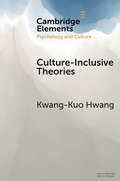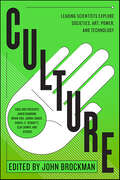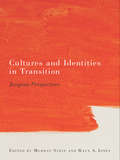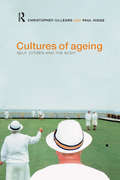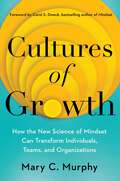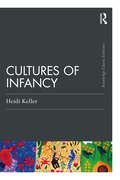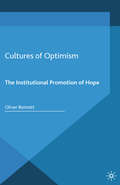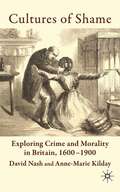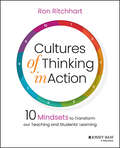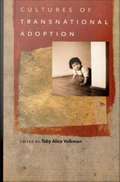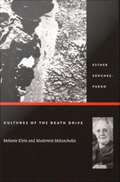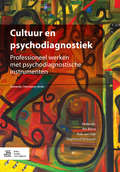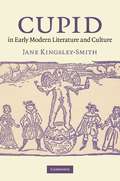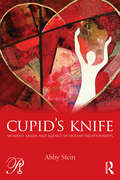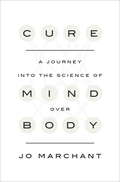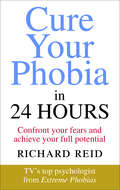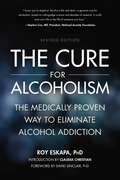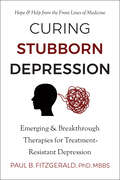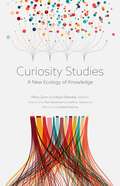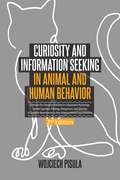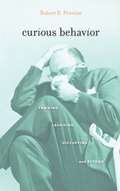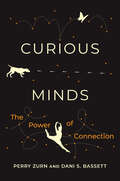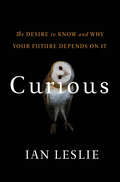- Table View
- List View
Culture-Inclusive Theories: An Epistemological Strategy (Elements in Psychology and Culture)
by Kwang-Kuo HwangThe author proposes an epistemological strategy to resolve controversial issues in the indigenous psychology (IP) movement. These include the nature of IPs, scientific standards, cultural concepts, philosophy of science, mainstream psychology, generalization of findings, and the isolation and independence of IPs. The approach includes a two-step strategy for construction of culture-inclusive theories, based on a Mandala model of self and a Face and Favor model for social interaction, and the use of these models to develop culture-inclusive theories for Confucian morphostasis. The author has successfully used this strategy, and encourages others to use it to construct their own culture-inclusive theories.
Culture: Leading Scientists Explore Civilizations, Art, Networks, Reputation, and the Online Revolution (Best of Edge Series)
by John Brockman"Theway Brockman interlaces essays about research on the frontiers of science withones on artistic vision, education, psychology and economics is sure to buzzany brain." —Chicago Sun-Times, on This Will Change EverythingLaunchinga hard-hitting new series from Edge.org and Harper Perennial, editor JohnBrockman delivers this cutting-edge master class covering everything you needto know about Culture. With original contributions by the world’sleading thinkers and scientists, including Jared Diamond, Daniel C. Dennett,Brian Eno, Jaron Lanier,Nicholas Christakis, and others, Culture offers a mind-expanding primeron a fundamental topic. Unparalleled in scope, depth, insight and quality, Edge.org’s Culture is not to be missed.
Cultures and Identities in Transition: Jungian Perspectives
by Murray SteinCultures and Identities in Transition returns to the roots of analytical psychology, offering a thematic approach which looks at personal and cultural identities in relation to Jung’s own identity and the identities of contemporary Jungians. The book begins with two clinical studies, representing a meeting point between the traditional praxis of Jungian analysis, on the one side, and the current zeitgeist, world events and collective anxieties as impacting on persons in therapy, on the other. An international range of expert contributors go on to discuss topics including: issues of national and personal identity – looking back to a shared history and forward to novel applications of Jungian ideas. Jung’s cross-disciplinary dialogues with Victor White. what the designation "Jungian" actually means. Based on papers given at the joint IAAP and IAJS conference held in Zurich in 2008, this book will be essential reading for all Jungians.
Cultures of Ageing: Self, Citizen and the Body
by Chris Gilleard Paul HiggsFor undergraduate courses in sociology and psychology which examine ageing adulthood. This book focuses on the dramatic changes to the nature of post-retirement life experienced by people at the end of the twentieth century. It examines age and ageing in terms of the key preoccupations of contemporary sociology - citizenship, the body and the self. The book provides a platform for a new social gerontology that sees ageing as central to our understanding of social change. It examines social, cultural and political changes in Europe and North America to address the need for a text that moves the study of ageing from social policy towards the mainstream of social science.
Cultures of Growth: How the New Science of Mindset Can Transform Individuals, Teams, and Organizations
by Mary C. MurphyAward-winning social psychologist Mary Murphy offers a groundbreaking reconsideration of individual and team success—showing how to create and sustain a growth mindset in any organization&’s culture.Carol Dweck&’s multi-million-copy bestseller Mindset transformed our view of individual potential, coining the terms &“fixed&” and &“growth&” mindset: in a &“fixed&” mindset, talent and intelligence are viewed as predetermined traits, while in a &“growth&” mindset, talent and intelligence can be nurtured. In Cultures of Growth, Dweck&’s protégé, Mary Murphy, a social psychologist at both Stanford and Indiana University, shows that mindset transcends individuals. A growth mindset culture can transform any group, team, or classroom to reach breakthroughs while also helping each person achieve their potential. Murphy&’s original decade-long research reveals that organizations and teams more geared toward growth inspire deeper learning, spark collaboration, spur innovation, and build trust necessary for risk-taking and inclusion. They are also less likely to cheat, cut corners, or steal each other&’s ideas. And they&’re more likely to achieve top results. In these cultures, great ideas come from people from all backgrounds and at all levels—not just those anointed as brilliant or talented. Discover how a culture of growth helped make outdoor retailer Patagonia a leader in its field; how Satya Nadella transformed Microsoft; how winemakers Robin McBride and Andréa McBride John are leading with a mindset to disrupt and diversify the entire wine industry; and how a New York school superintendent reversed massive inequities for children of color by reshaping the district&’s mindset culture. Drawing on compelling examples from her work with Fortune 500 companies, startups, and schools, Murphy demonstrates that an organization&’s mindset culture is the key to success for individuals, teams, and the entire organization, teaching you how to create and sustain a culture of growth no matter your role. Create environments where people want to be, where everyone can thrive and achieve their potential, both individually and together. In a world where success seems reserved for a chosen few, Cultures of Growth unveils a radically different approach to creating organizations that inspire learning, growth, and success at all levels.
Cultures of Infancy (Psychology Press & Routledge Classic Editions)
by Heidi KellerThe Classic Edition of Heidi Keller’s Cultures of Infancy, first published in 2007, includes a new introduction by the author, which describes for readers the original context of her work, how she has further developed her research and thinking, and the ongoing relevance of this volume in the context of future challenges for the field. In its original volume, Cultures of Infancy presented the first systematic analysis of culturally informed developmental pathways, synthesizing evolutionary and cultural psychological perspectives for a broader understanding of human development. In this compelling book, Heidi Keller utilizes ethnographic reports, as well as quantitative and qualitative analyses, to illustrate how humans resolve universal developmental tasks in particular sociodemographic contexts. These contexts are represented in cultural models, with three distinct models addressed throughout the text: the model of independence with autonomy as developmental organizer; the model of interdependence with relatedness as the developmental organizer; and the model of autonomous relatedness representing particular mixtures of autonomy and relatedness. The book offers an empirical examination of the first integrative developmental task during the early months of life—relationship formation. Keller shows that early parenting experiences shape the basic foundation of the self within particular models of parenting that are influenced by culturally informed socialization goals. With distinct patterns of results that the studies have revealed, Cultures of Infancy helps redefine developmental psychology as part of a culturally informed science based on evolutionary groundwork. Scholars interested in a broad perspective on human development and culture will benefit from this pioneering volume.
Cultures of Optimism: The Institutional Promotion of Hope
by Oliver BennettWhat are the functions of optimism in modern societies? How is hope culturally transmitted? What values and attitudes does it reflect? This book explores how and why powerful institutions propagate 'cultures of optimism' in different domains, such as politics, work, the family, religion and psychotherapy.
Cultures of Shame
by David Nash Anne-Marie KildayThe first systematic study of the concept of shame from 1600-1900, showing good and bad behaviour, morality and perceptions of crime in British society at large. Single episodes in the history of shame are contextualized by discussing the historiography and theory of shame and their implications for the history of crime and social relations.
Cultures of Thinking in Action: 10 Mindsets to Transform our Teaching and Students' Learning
by Ron RitchhartFrom leading educational researcher Ron Ritchhart, a deep dive that illuminates what the foundational mindsets needed to create cultures of thinking really looks like in action. Building on the framework presented in the best-selling Creating Cultures of Thinking, Ron Ritchhart’s new book, Cultures of Thinking in Action, takes the next step in helping readers not only understand how a culture of thinking looks and feels, but also how to create it for themselves and their learners. Arguing that no set of practices or techniques alone is sufficient to create a culture of thinking in and of itself, Ritchhart explores the underlying beliefs that motivate the creation of cultures of thinking, presenting key mindsets every educator and leader needs to embrace if they are serious about creating powerful thinkers and learners. Much more than just an instructional guide, Cultures of Thinking in Action offers readers a reflective journey into their own teaching, leading, and parentingwhile providing the foundation and concrete strategies needed to create and develop a culture of thinking for all learners. This book: Presents ten foundational mindsets of a culture of thinking Includes the latest research of the Cultures of Thinking Project Includes questions, exercises, and discussion prompts to inspire reflection by individuals and teams Provides case studies and best practice scenarios to exemplify each mindset Provides useful data collection tools to inform one’s teaching practice
Cultures of Thinking in Action: 10 Mindsets to Transform our Teaching and Students' Learning
by Ron RitchhartFrom leading educational researcher Ron Ritchhart, a deep dive that illuminates what the foundational mindsets needed to create cultures of thinking really looks like in action. Building on the framework presented in the best-selling Creating Cultures of Thinking, Ron Ritchhart’s new book, Cultures of Thinking in Action, takes the next step in helping readers not only understand how a culture of thinking looks and feels, but also how to create it for themselves and their learners. Arguing that no set of practices or techniques alone is sufficient to create a culture of thinking in and of itself, Ritchhart explores the underlying beliefs that motivate the creation of cultures of thinking, presenting key mindsets every educator and leader needs to embrace if they are serious about creating powerful thinkers and learners. Much more than just an instructional guide, Cultures of Thinking in Action offers readers a reflective journey into their own teaching, leading, and parentingwhile providing the foundation and concrete strategies needed to create and develop a culture of thinking for all learners. This book: Presents ten foundational mindsets of a culture of thinking Includes the latest research of the Cultures of Thinking Project Includes questions, exercises, and discussion prompts to inspire reflection by individuals and teams Provides case studies and best practice scenarios to exemplify each mindset Provides useful data collection tools to inform one’s teaching practice
Cultures of Transnational Adoption
by Toby Alice VolkmanDuring the 1990s, the number of children adopted from poorer countries to the more affluent West grew exponentially. Close to 140,000 transnational adoptions occurred in the United States alone. While in an earlier era, adoption across borders was assumed to be straightforward--a child traveled to a new country and stayed there--by the late twentieth century, adoptees were expected to acquaint themselves with the countries of their birth and explore their multiple identities. Listservs, Web sites, and organizations creating international communities of adoptive parents and adoptees proliferated. With contributors including several adoptive parents, this unique collection looks at how transnational adoption creates and transforms cultures. The cultural experiences considered in this volume raise important questions about race and nation; about kinship, biology, and belonging; and about the politics of the sending and receiving nations. Several essayists explore the images and narratives related to transnational adoption. Others examine the recent preoccupation with "roots" and "birth cultures. " They describe a trip during which a group of Chilean adoptees and their Swedish parents traveled "home" to Chile, the "culture camps" attended by thousands of young-adult Korean adoptees whom South Korea is now eager to reclaim as "overseas Koreans," and adopted children from China and their North American parents grappling with the question of what "Chinese" or "Chinese American" identity might mean. Essays on Korean birth mothers, Chinese parents who adopt children within China, and the circulation of children in Brazilian families reveal the complexities surrounding adoption within the so-called sending countries. Together, the contributors trace the new geographies of kinship and belonging created by transnational adoption. Contributors. Lisa Cartwright, Claudia Fonseca, Elizabeth Alice Honig, Kay Johnson, Laurel Kendall, Eleana Kim, Toby Alice Volkman, Barbara Yngvesson
Cultures of the Death Drive: Melanie Klein and Modernist Melancholia
by Esther Sánchez PardoCultures of the Death Drive is a comprehensive guide to the work of pioneering psychoanalyst Melanie Klein (1882-1960) and to developments in Kleinian theory to date. It is also an analysis and a demonstration of the distinctive usefulness of Klein's thought for understanding modernist literature and visual art. Esther Snchez-Pardo examines the issues that the seminal discourses of psychoanalysis and artistic modernism brought to the fore in the early twentieth century and points toward the uses of Kleinian thinking for reconceptualizing the complexities of identity and social relations today. Snchez-Pardo argues that the troubled political atmosphere leading to both world wars created a melancholia fueled by "cultures of the death drive" and the related specters of object loss--loss of coherent and autonomous selves, of social orders where stability reigned, of metaphysical guarantees, and, in some cases, loss and fragmentation of empire. This melancholia permeated, and even propelled, modernist artistic discourses. Snchez-Pardo shows how the work of Melanie Klein, the theorist of melancholia par excellence, uniquely illuminates modernist texts, particularly their representations of gender and sexualities. She offers a number of readings--of works by Virginia Woolf, Ren Magritte, Lytton Strachey, Djuna Barnes, and Countee Cullen--that reveal the problems melancholia posed for verbal and visual communication and the narrative and rhetorical strategies modernist artists derived to either express or overcome them. In her afterword, Snchez-Pardo explicates the connections between modernist and contemporary melancholia. A valuable contribution to psychoanalytic theory, gender and sexuality studies, and the study of representation in literature and the visual arts, Cultures of the Death Drive is a necessary resource for those interested in the work of Melanie Klein.
Cultuur en psychodiagnostiek: Professioneel werken met psychodiagnostische instrumenten
by Ria Borra Rob Van Dijk Raymond VerboomTal van psychodiagnostische instrumenten zijn niet gevalideerd voor etnisch-culturele minderheidsgroepen in Nederland. In dit boek, bedoeld voor de interculturele hulpverleningspraktijk van de GGZ, worden de problemen in de interculturele psychodiagnostiek geschetst. Er worden methoden aangereikt hoe op een professionele manier deze problemen het hoofd te bieden. Aan de hand van casuïstiek geven ervaren interculturele hulpverleners inzicht in hoe psychologische instrumenten kunnen worden toegepast op een cultuur sensitieve manier. De regulatieve cyclus wordt gebruikt als een methodisch handvat voor een zorgvuldig, systematisch en reflexief handelen in dit psychodiagnostische proces.
Cupid in Early Modern Literature and Culture
by Jane Kingsley-SmithCupid became a popular figure in the literary and visual culture of post-Reformation England. He served to articulate and debate the new Protestant theory of desire, inspiring a dark version of love tragedy in which Cupid kills. But he was also implicated in other controversies, as the object of idolatrous, Catholic worship and as an adversary to female rule: Elizabeth I's encounters with Cupid were a crucial feature of her image-construction and changed subtly throughout her reign. Covering a wide variety of material such as paintings, emblems and jewellery, but focusing mainly on poetry and drama, including works by Sidney, Shakespeare, Marlowe and Spenser, Kingsley-Smith illuminates the Protestant struggle to categorise and control desire and the ways in which Cupid disrupted this process. An original perspective on early modern desire, the book will appeal to anyone interested in the literature, drama, gender politics and art history of the English Renaissance.
Cupid's Knife: Women's Anger And Agency In Violent Relationships (Psychoanalysis in a New Key Book Series)
by Abby SteinMuch domestic violence literature has called attention to the fact that women's material needs for shelter, daycare, employment, and legal protection may render them helpless to leave toxic relationships. Yet, even with the provision of these, many women remain tightly wound in their abusers' embrace. In Cupid's Knife: Women's Anger and Agency in Violent Relationships, Abby Stein draws on the gripping narratives of physically and emotionally abused women to illuminate how splitting off their own aggression undermines women's agency, making it almost impossible for them to leave violent partners. Psychology, with its focus on 'managing' men's anger in violent relationships, has had little to offer in the way of substantive critical work with women on the identification, integration and constructive use of a range of darker emotions typically labelled as antithetical to the norms for female behaviour. In this book, Abby Stein shows that although a number of psychological processes that contribute to the intractability of abusive relationships have been identified – such as trauma bonding and learned helplessness – their recognition has offered no clinical pathway out of the abyss. Stein suggests that our attention to other aspects of the internal world, the relational framework, and the cultural context in which both operate, may be more useful than current interventions in determining individual treatments that break the oft-cited 'cycle of violence'. More globally, Cupid's Knife: Women's Anger and Agency in Violent Relationships jumpstarts a provocative conversation about how female aggression can be repurposed as a catalyst for social change. It will be essential reading for psychoanalysts, psychologists, psychiatrists, sociologists, criminologists, students and the lay reader with an interest in clinical treatment, interpersonal psychoanalysis, domestic violence, gender roles, dissociation and aggression.
Cure
by Jo Marchant<P>A rigorous, skeptical, deeply reported look at the new science behind the mind's extraordinary ability to heal the body. <P>Have you ever felt a surge of adrenaline after narrowly avoiding an accident? Salivated at the sight (or thought) of a sour lemon? Felt turned on just from hearing your partner's voice? If so, then you've experienced how dramatically the workings of your mind can affect your body. <P>Yet while we accept that stress or anxiety can damage our health, the idea of "healing thoughts" was long ago hijacked by New Age gurus and spiritual healers. Recently, however, serious scientists from a range of fields have been uncovering evidence that our thoughts, emotions, and beliefs can ease pain, heal wounds, fend off infection and heart disease, even slow the progression of AIDS and some cancers. <P>In Cure, award-winning science writer Jo Marchant travels the world to meet the physicians, patients, and researchers on the cutting edge of this new world of medicine. We learn how meditation protects against depression and dementia, how social connections increase life expectancy, and how patients who feel cared for recover from surgery faster. <P>We meet Iraq war veterans who are using a virtual arctic world to treat their burns and children whose ADHD is kept under control with half the normal dose of medication. We watch as a transplant patient uses the smell of lavender to calm his hostile immune system and an Olympic runner shaves vital seconds off his time through mind-power alone. <P>Drawing on the very latest research, Marchant explores the vast potential of the mind's ability to heal, acknowledges its limitations, and explains how we can make use of the findings in our own lives. <P><b>A New York Times Bestseller</b>
Cure Your Phobia in 24 Hours: Confront your fears and achieve your full potential
by Richard ReidBurst through the fear!Is your fear of flying preventing you from taking that life changing holiday? Are you terrified of leaving the house in case you run into a dog? Do you plan your day around avoiding your fears?If your fear, phobia or anxiety is taking over your life and stopping you from living the way you want, then Cure Your Phobia in 24 Hours is here to help. Through carefully honed techniques and strategies, psychotherapist and CBT expert Richard Reid will unlock your true inner potential. As well as overcoming your immediate fear or phobia in record time by expanding your comfort zone in a step-by-step plan, Richard will also help you build long term strategies, teaching you to discredit negative thinking and grow confidence to be the fearless person you’ve always want to be.Reassuring, warm and hugely practical, with accessible guides for every phobia from Agoraphobia to Ornithophobia, advice on how to manage anxiety and panic attacks and easy-to-use, practical guidance to help you on your journey, Richard will be with you every step of the way.In Sky’s Extreme Phobias, Extreme Cures, Richard helped dozens of people overcome their greatest fears in a matter of hours. With his help, in just 24 hours you too can be phobia-free and ready to grab life with both hands.
Cure for Alcoholism: The Medically Proven Way to Eliminate Alcohol Addiction
by Roy EskapaFinally, there is a cure for alcoholism. This is the first step. Featuring new and updated information and studies, including an introduction by actress Claudia Christian, the second edition of The Cure for Alcoholism delivers exactly what millions of alcoholics and families of alcoholics have been hoping for: a painless, dignified, and medically proven cure for their addiction. Backed by 82 clinical trials and research that extends back to 1964, The Sinclair Method deploys an opiate-blocking medication in a very specific way—in combination with ongoing drinking—to extinguish the addictive "software" in the brain. The de-addiction process rolls back the addictive mechanism in the brain to its original pre-addicted state—before the first drink was consumed, making this program an actual cure for alcoholism. Drs. Roy Eskapa and David Sinclair of The Sinclair Method have put together a sound scientific book that proves that with this particular method, alcoholism can be cured in more than 78 percent of patients. What's more, the treatment avoids the dangerous withdrawal symptoms, allowing patients to detox gradually and safely while they are still drinking. This removes the need for expensive and unpleasant inpatient rehabilitation programs. Actual drinking levels and cravings automatically decrease until control over alcohol is restored. The bottom line is that patients can control their drinking or stop altogether with the simple yet powerful process outlined in The Cure for Alcoholism. Including a new introduction by actress Claudia Christian about The Sinclair Method's impact on her life, updated trial information, and a letter explaining the treatment that can be given to doctors by patients, The Cure for Alcoholism is a revolutionary book for anyone who wants to gain control over drinking.
Cure: A Journey into the Science of Mind Over Body
by Jo MarchantA New York Times BestsellerFinalist for the Royal Society Insight Investment Science Book PrizeA rigorous, skeptical, deeply reported look at the new science behind the mind's surprising ability to heal the bodyHave you ever felt a surge of adrenaline after narrowly avoiding an accident? Salivated at the sight (or thought) of a sour lemon? Felt turned on just from hearing your partner's voice? If so, then you've experienced how dramatically the workings of your mind can affect your body. Yet while we accept that stress or anxiety can damage our health, the idea of "healing thoughts" was long ago hijacked by New Age gurus and spiritual healers. Recently, however, serious scientists from a range of fields have been uncovering evidence that our thoughts, emotions and beliefs can ease pain, heal wounds, fend off infection and heart disease and even slow the progression of AIDS and some cancers. In Cure, award-winning science writer Jo Marchant travels the world to meet the physicians, patients and researchers on the cutting edge of this new world of medicine. We learn how meditation protects against depression and dementia, how social connections increase life expectancy and how patients who feel cared for recover from surgery faster. We meet Iraq war veterans who are using a virtual arctic world to treat their burns and children whose ADHD is kept under control with half the normal dose of medication. We watch as a transplant patient uses the smell of lavender to calm his hostile immune system and an Olympic runner shaves vital seconds off his time through mind-power alone. Drawing on the very latest research, Marchant explores the vast potential of the mind's ability to heal, lays out its limitations and explains how we can make use of the findings in our own lives. With clarity and compassion, Cure points the way towards a system of medicine that treats us not simply as bodies but as human beings.From the Hardcover edition.
Curing Stubborn Depression: Emerging & Breakthrough Therapies for Treatment-Resistant Depression
by Paul FitzgeraldHope and help arrives in this psychiatrist's preview of emerging and breakthrough therapies for treating more severe, treatment-resistant depression.Over 280 million individuals worldwide suffer from depression every year, with many turning to potent antidepressants and drastic lifestyle changes to help manage their condition and improve their quality of life.But what if these methods don&’t work? What if, despite all efforts, an individual continues to suffer?Stubborn, treatment-resistant depression dramatically reduces a person&’s quality of life while providing them with seemingly few options for relief.Curing Stubborn Depression seeks to not only explain the underlying causes of this pervasive form of depressive disorder, but to shine light on a number of non-traditional treatments, new therapies and clinical developments—including ECT, transcranial magnetic stimulation, bright light therapy, ketamine and more.The field of depression treatment is rapidly evolving and constantly changing, meaning it can be difficult to keep up with new therapies and clinical developments. Curing Stubborn Depression delves into these emergent treatments, many of which are transforming how this condition is managed—and offering hope to those who feel like they have none.
Curiosity Studies: A New Ecology of Knowledge
by Perry Zurn Arjun ShankarThe first English-language collection to establish curiosity studies as a unique field From science and technology to business and education, curiosity is often taken for granted as an unquestioned good. And yet, few people can define curiosity. Curiosity Studies marshals scholars from more than a dozen fields not only to define curiosity but also to grapple with its ethics as well as its role in technological advancement and global citizenship. While intriguing research on curiosity has occurred in numerous disciplines for decades, no rigorously cross-disciplinary study has existed—until now. Curiosity Studies stages an interdisciplinary conversation about what curiosity is and what resources it holds for human and ecological flourishing. These engaging essays are integrated into four clusters: scientific inquiry, educational practice, social relations, and transformative power. By exploring curiosity through the practice of scientific inquiry, the contours of human learning, the stakes of social difference, and the potential of radical imagination, these clusters focus and reinvigorate the study of this universal but slippery phenomenon: the desire to know. Against the assumption that curiosity is neutral, this volume insists that curiosity has a history and a political import and requires precision to define and operationalize. As various fields deepen its analysis, a new ecosystem for knowledge production can flourish, driven by real-world problems and a commitment to solve them in collaboration. By paying particular attention to pedagogy throughout, Curiosity Studies equips us to live critically and creatively in what might be called our new Age of Curiosity.Contributors: Danielle S. Bassett, U of Pennsylvania; Barbara M. Benedict, Trinity College; Susan Engel, Williams College; Ellen K. Feder, American U; Kristina T. Johnson, Massachusetts Institute of Technology; Narendra Keval; Christina León, Princeton U; Tyson Lewis, U of North Texas; Amy Marvin, U of Oregon; Hilary M. Schor, U of Southern California; Seeta Sistla, Hampshire College; Heather Anne Swanson, Aarhus U.
Curiosity and Information Seeking in Animal and Human Behavior: A Review the Literature and Data in Comparative Psychology, Animal Cognition, Ethology, Ontogenesis, and Elements of Cognitive Neuroscience as they Relate to Animal Inquisitiveness (2nd Edition)
by Wojciech PisulaThe purpose of the book is to deliver a critical review of the literature and author's research data relevant for understanding the phenomena of curiosity, information seeking behavior, and novelty seeking. The book is designed to be a comprehensive and s
Curious Behavior: Yawning, Laughing, Hiccupping, And Beyond
by Robert R. ProvineRobert Provine boldly goes where other scientists seldom tread-in search of hiccups, coughs, yawns, sneezes, and other lowly, undignified human behaviors. Upon investigation, these instinctive acts bear the imprint of our evolutionary origins and can be uniquely valuable tools for understanding how the human brain works and what makes us different from other species. Many activities showcased in Curious Behavior are contagious, but none surpasses yawning in this regard-just reading the word can make one succumb. Though we often take it as a sign of sleepiness or boredom, yawning holds clues to the development of our sociality and ability to empathize with others. Its inescapable transmission reminds us that we are sometimes unaware, neurologically programmed beasts of the herd. Other neglected behaviors yield similar revelations. Tickling, we learn, may be the key to programming personhood into robots. Coughing comes in musical, medical, and social varieties. Farting and belching have import for the evolution of human speech. And prenatal behavior is offered as the strangest exhibit of all, defying postnatal logic in every way. Our earthiest acts define Homo sapiens as much as language, bipedalism, tool use, and other more studied characteristics. As Provine guides us through peculiarities right under our noses, he beckons us to follow with self-experiments: tickling our own feet, keeping a log of when we laugh, and attempting to suppress yawns and sneezes. Such humble investigations provide fodder for grade school science projects as well as doctoral dissertations. Small Science can yield big rewards.
Curious Minds: The Power of Connection
by Perry Zurn Dani S. BassettAn exhilarating, genre-bending exploration of curiosity&’s powerful capacity to connect ideas and people.Curious about something? Google it. Look at it. Ask a question. But is curiosity simply information seeking? According to this exhilarating, genre-bending book, what&’s left out of the conventional understanding of curiosity are the wandering tracks, the weaving concepts, the knitting of ideas, and the thatching of knowledge systems—the networks, the relations between ideas and between people. Curiosity, say Perry Zurn and Dani Bassett, is a practice of connection: it connects ideas into networks of knowledge, and it connects knowers themselves, both to the knowledge they seek and to each other. Zurn and Bassett—identical twins who write that their book &“represents the thought of one mind and two bodies&”—harness their respective expertise in the humanities and the sciences to get irrepressibly curious about curiosity. Traipsing across literatures of antiquity and medieval science, Victorian poetry and nature essays, as well as work by writers from a variety of marginalized communities, they trace a multitudinous curiosity. They identify three styles of curiosity—the busybody, who collects stories, creating loose knowledge networks; the hunter, who hunts down secrets or discoveries, creating tight networks; and the dancer, who takes leaps of creative imagination, creating loopy ones. Investigating what happens in a curious brain, they offer an accessible account of the network neuroscience of curiosity. And they sketch out a new kind of curiosity-centric and inclusive education that embraces everyone&’s curiosity. The book performs the very curiosity that it describes, inviting readers to participate—to be curious with the book and not simply about it.
Curious: The Desire to Know and Why Your Future Depends On It
by Ian LeslieToday it seems we have the world at our fingertips. Thanks to smartphones and tools such as Google and Wikipedia, we’re able feed any aspect of our curiosity instantly. But does this mean we are actually becoming more curious? Absolutely not. In Curious, Ian Leslie argues that true curiosity--the sustained quest for understanding that begets insight and innovation--is becoming increasingly difficult to harness in our wired world. We confuse ease of access to information with curiosity, and risk losing our ability to ask questions that extend our knowledge gap rather than merely filling it. Worst of all, this decline in curiosity has led to a decline in empathy and our ability to care about those around us. Combining the latest science with an urgent call to cultivate curious minds, Curious draws on psychology, social history, and popular culture to show that being deeply curious is our only hope when it comes to solving current crises--as well as an essential part of being human.
